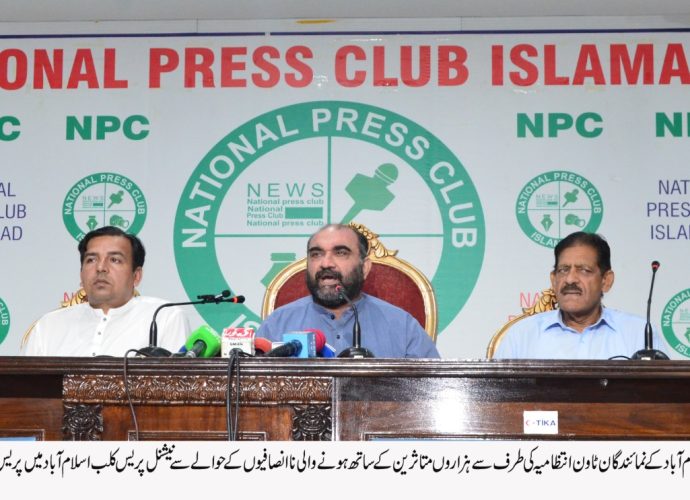ISLAMABAD STAFF REPORTER
The affected allottees of the University Town Housing Society have strongly condemned the Speaking Order issued by the Director General of Rawalpindi Development Authority (RDA), calling it vague, ineffective, and biased. In a press conference held at the National Press Club, Islamabad, community representatives alleged that the RDA’s order reflects collusion and undue favor to the developer, and fails to address the genuine grievances of thousands of victims who have suffered due to massive fraud and mismanagement over the past three decades.
Prominent complainants including Umar Siddique Khattak, Arshad Hussain Zalmi, Malik Nisar Ahmed, Barrister Mumtaz Babar, Advocate Sarfaraz Chadhar, Asim Shehzad, Haroon-ur-Rashid, Shafqat Ali, and Khalid Masood Bajwa accused the developer of making false claims of 75% development, while the actual ground development remains below 30%, leaving most of the society underdeveloped and residents deprived of basic infrastructure.
The affected parties revealed that University Town originated in 1992 as a housing scheme for employees of Allama Iqbal Open University under the name Khyber Welfare Housing Society (KWHS). However, its convener, Abdul Aziz Khan, allegedly forged documents, registered the society fraudulently in Faisalabad, later shifting to the SECP as a private company named University Town Private Limited, without members’ consent. Through this maneuver, he obtained a new NOC in 2021 from RDA under a private commercial framework, effectively transforming the cooperative society into a profit-making enterprise.
Despite several complaints, the RDA allegedly ignored glaring irregularities, including:
- Issuing an NOC for 3,454 kanals, though only 2,350 kanals are legally owned by the developer;
- Selling bogus files for over 3,000 plots;
- Illegally charging members for additional development fees, LPG plant charges, litigation costs, and miscellaneous expenses;
- Selling plots on land belonging to a neighboring housing society, and later canceling them.
In 2024, following hundreds of formal complaints, the DG RDA convened a meeting on September 18, 2024, where the CEO of University Town, Abdul Aziz Khan, signed a 27-point commitment to address all grievances. Yet, as of July 2025, not a single point has been acted upon by the management.
An FIR No. 597/25, under Sections 420, 468, and 471 PPC, was lodged at Police Station Naseerabad, Rawalpindi on March 18, 2025, after a detailed RDA investigation confirmed fraud. The accused obtained pre-arrest bail, which was cancelled on May 7, 2025, by Judge Ikramullah Chaudhry. The suspects then approached the Lahore High Court Rawalpindi Bench, which conditionally extended their bail, linking further proceedings to the implementation of the RDA’s Speaking Order, following hearings with both the victims and the developer on June 23-24, 2025.
However, the final Speaking Order issued by RDA on June 30, 2025, though officially in response to the court’s directives, has failed to offer any real or enforceable relief to the aggrieved parties. This has led to growing suspicion that RDA may be trying to whitewash past regulatory failures, retroactively legitimize the scheme’s violations, and maintain appearances of progress without actual reform.
The High Court has now extended the bail of the accused until July 30, 2025, and RDA’s legal counsel has requested time to ensure compliance with the Speaking Order. Meanwhile, the victims have also filed formal complaints with the Chairman of the National Accountability Bureau (NAB), demanding a full-scale investigation and accountability of both the developer and complicit regulatory officials.
A public protest was also staged outside the National Press Club, where the victims demanded the formation of an independent judicial commission to investigate the matter transparently and ensure justice, refunds, and delivery of promised plots and infrastructure.
Victims vowed to continue their legal battle, including filing new writ petitions and maintaining pressure through the courts and media to prevent further exploitation and achieve justice in what has become one of the most controversial housing scams in the region.


